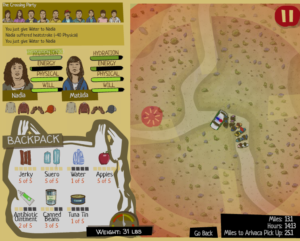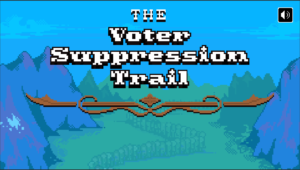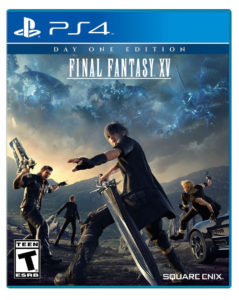
Episodes coming 8/24.

Episodes coming 8/24.

First, an important note: This will be our last episode for a while. Brandon and I have both developed outside commitments that keep us from spending the time to do more episodes right. We might be back someday! But please enjoy this and each of our past episodes – we’re proud of each one, and I think they’ll still be relevant down the line.
To anybody who has ever listened to an episode: I sincerely thank you.

We’re also releasing this episode outside of our normal schedule, because there’s a natural connection to an event coming up on this Tuesday, 4/4/17:
Over 190 movie theaters will run special screenings of 1984.
This connection will make sense if you even glance at the PC game Orwell. While not an official tie-in to 1984, it’s obviously heavily inspired by that book.
You play a government employee who monitors the web and private communications for evidence of terrorism. You have frequent choices about whether or not to report chunks of information. You might wrongly imprison someone, but you might also fail to prevent a bombing.
Orwell is fun and compelling to play, mostly avoids getting preachy, and provides a unique way to think about current events. It’s $9.99 on Steam, and has a free demo available.

 Released in early February, We Are Chicago is a serious game with serious goals: to put players in the shoes of a teenager amid the problems of Chicago’s South Side. As Aaron you navigate the landscape of gangs, high school, family dynamics, and a part-time job.
Released in early February, We Are Chicago is a serious game with serious goals: to put players in the shoes of a teenager amid the problems of Chicago’s South Side. As Aaron you navigate the landscape of gangs, high school, family dynamics, and a part-time job.
Structured almost identically to a Telltale game, you are presented with dialog choices in sometimes difficult situations.
But for us, the game didn’t live up to its lofty goals.
Bugs, strange narrative choices, and some fundamental structural issues distracted and took away from what might otherwise have been a real chance to put ourselves in a world we’d never otherwise encounter. While we salute what the game was trying to do, hopefully future games will be able to execute just a little bit better.
We Are Chicago is $14.99 on Steam.


The game is more than two years old and based on an event from the 90s, but This War of Mine still feels fresh and relevant.
This War of Mine drops you in the middle of a city under siege. But you’re not a well-equipped well-trained super-soldier packing the latest gadgets.
You’re a civilian, just trying to make it to the next morning. This is more Survivalist Sims than Call of Duty.
Developers 11 Bit Studios set out to re-create the experience of the ’92-’96 siege of Sarajevo, but it’s just as applicable to today’s Syrian civil war.
Resources are scarce and violence is sudden and swift. You can steal from or murder others to get by, but that decision has significant mental consequences for your characters.
We found lots to appreciate in the message and basic mechanics of This War of Mine. But unfortunately the extreme difficulty, lack of a tutorial, and opaque goals hamper what might otherwise be a successful effort to raise awareness about the consequences of war on civilians and refugees.


With immigration and a border wall in the news this week, it’s a good time to look at 2013’s The Migrant Trail.
Released as a tie-in for Marco Williams’ documentary The Undocumented, The Migrant Trail is a browser-based game where you’re in the shoes of either an undocumented immigrant attempting to cross the Arizona border, or a border patrol agent on the lookout for border crossers.
If you’ve played Oregon Trail, you know how the basic mechanics work. You select a person to attempt crossing as, and purchase supplies within a budget. Along the way you consume supplies to keep stats above zero and make decisions about the rest of your party.
As a border patrol agent, you drive through the desert looking for signs of life or any illegal crossings in progress.
The Migrant Trail is a more well-rounded attempt to tackle an issue than Voter Suppression Trail was last time, but some interface difficulties and game design choices keep it from being a complete success.
Special thanks to Todd Haefele for our new intro music!

 Welcome back to season two!
Welcome back to season two!
We’re slightly shifting focus to social impact games: games that explore social issues like elections, climate change, homelessness, and immigration.
Each episode will evaluate the effectiveness of a different game. What was it trying to accomplish? Did it work? Our goal isn’t to take a stance on the issues or evaluate the accuracy of the games, but to examine how effective their design is at achieving their goals.
We’ll draw on the theories and ideas we talked about in past episodes, plus bring in new perspectives whenever we can.
We’re also going bi-weekly.
Since the 2017 Inauguration is a major event this week, our season premiere is on topic with Voter Suppression Trail. Released shortly before the 2016 Presidential election, this was the New York Times’ first stab at a video game editorial.
Borrowing liberally from Oregon Trail’s design style, Voter Suppression Trail puts you in the shoes of three potential voters: A white programmer from California, a Latina nurse from Texas, and a Black salesman from Wisconsin. Each of them has varying obstacles to overcome as they wait in line to vote.
What impact did it have on players? We think it was only partially successful in drawing attention to real electoral issues. Listen to the episode to find out why.


Many games put you in the role of someone else. It’s right in the name of at least one genre: Role-Playing Game.
We identify with each of these avatars to varying degrees. It’s hard to feel much of a connection with Pac-Man, but Link and Chrono were much easier to map onto ourselves.
What did we take away from that mapping? What does current research say about how we relate to our avatars?
This week Brandon introduces theories about how we connect with games’ avatars, then we look at Final Fantasy XV as an example. What opportunities does it take or miss to link us with Prince Noctis?
And what does this all have to do with Clippy, anyway?


Spacewar!, one of the first games to use a controller, ran on the PDP-1 computer.
But is another angle on this idea true too? Is expertise using the buttons on a console controller transferable to actual job skills?
Militaries around the world certainly seem to think so.
More broadly, it might make sense to design interfaces around skills and aptitudes that users have already learned elsewhere.
Gamers often learn how to use a controller at a very young age, when their brains are more plastic. So let’s take advantage of that.

 It’s not often there’s breaking news in the world of academic articles on gaming, but a potential retraction of an article is worth talking about.
It’s not often there’s breaking news in the world of academic articles on gaming, but a potential retraction of an article is worth talking about.
A 2014 study called “Boom, Headshot! Effect of Video Game Play and Controller Type on Firing Aim and Accuracy†concluded that playing games with a gun-shaped controller, even briefly, will make the player much more accurate at shooting a real gun.
That study went on to be cited in policy documents and the news, but there’s just one problem: some of the data may have been falsified or manipulated.
What does this mean for academic gaming research? Can or should we trust a single published study?

 Last week we talked about self-efficacy, particularly how it relates to the high difficulty of the Dark Souls series. But Dark Souls actually goes against lots of advice about the relationship between self-efficacy and performance.
Last week we talked about self-efficacy, particularly how it relates to the high difficulty of the Dark Souls series. But Dark Souls actually goes against lots of advice about the relationship between self-efficacy and performance.
It turns out there’s also controversy about giving rewards just to build self confidence or self-efficacy. Should we all get trophies for participation? Is that really helpful in the long run? Bloodborne give us another example to look at.
This week we talk about some other models of how self-efficacy and performance might relate to each other. For example, induced failure can be useful in building longer-term confidence.
Games like the Zelda series tend to give you a difficult challenge, then introduce a tool that makes the task much easier. You use it to solve that challenge, and then you’re presented with an even more difficult challenge that requires the same tool. But now you’ve had time to build your confidence with it.
Lastly, we pull all this together into a theory of why Dark Souls might actually be fun after all. You’re not as great a gamer as you think you are, but you can get there.